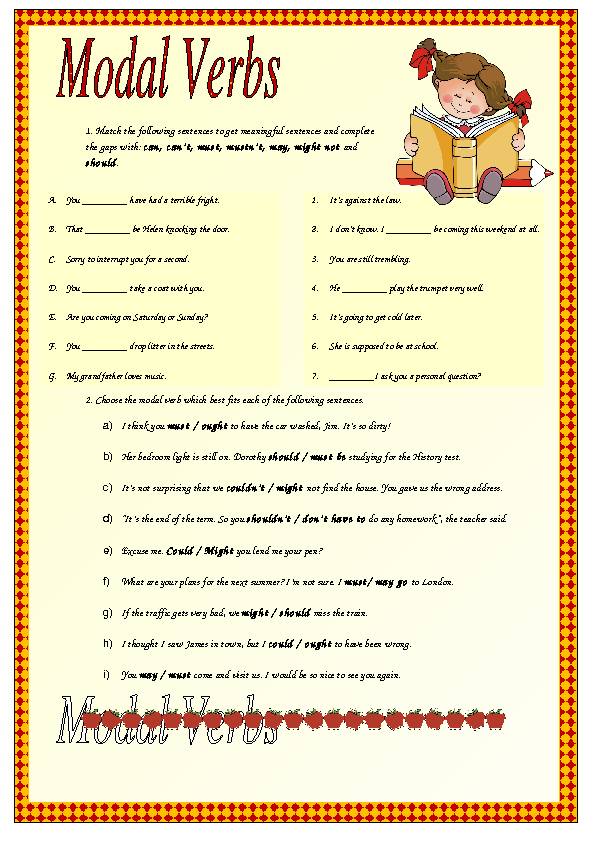
Had better is stronger than should and ought to.

If we have enough time, we could go to the park later.Many years ago, people could travel without passports.When I was young, I could eat tons of ice cream!.We use could to talk about what we were able to do in the past and to talk about ability in conditionals. She can help you with your homework later today.We use can to talk about things that we are able to do in the present or the immediate future. These modal verbs are usually used to show ability. They contain complete lesson plans with absolutely everything you need to teach or learn the modal verbs in English. In these worksheets, we will review the following groups of verbs:įor complete information on modal verbs, you can try our English Modal Verbs Series. In English, we use modal verbs all the time! It is very important to understand the different ways that we can use each verb. Modal verbs are special kinds of verbs in English that express ability, permission, obligation, possibility, and polite requests. First, we will look at some examples, and then you can practice with the exercises. These worksheets will help you review how and when to use modal verbs. > ABOUT THIS SITE: Copyright Laurent Camus - Learn more / Help / Contact | Do not copy or translate - site protected by an international copyright | Cookies | Legal notices.


| Get | Grammar | Guide | Harry Potter | Have | Homonyms | How words are built | Human body | I like, I dislike | Idioms | Imperative | Impersonal | Infinitive | Introducing someone | Inversion | Irregular verbs | Jobs | Journeys | Linking words | Literature | Make or do? | Making portraits, describing | Mars | Matilda | Methodology | Modals | Movements | Music | Nature | Negation | Newspaper | Nouns | Numbers | Online activities | Opinions | Opposite words | Particles | Passive voice | Past | Past habits | Phone calls | Placement tests | Plural | Poems | Politeness | Prepositions | Present | Present participle | Present perfect | Plu perfect| Pronouns | Pronunciation | Punctuation | Quantities | Question Tags | Questions | Relative sentences | Say, tell or speak? | School | Several tests | Slang words, colloquial words | Snow | Songs | Speaking | Sports | Subject-Verb agreement | Subjunctive | Subordinate clauses | Suggesting | Synonyms | Tales | The Internet | The house | The weather | There is/There are | This or That? | To have someone do something | Towns | Translations | USA | United Kingdom | Video | Waiting for approval | What time is it? | With a lesson | Writing a letter | Clothes | Colours/Colors | Comparisons | Compound words | Conditional and hypothesis | Conjunctions | Contractions | Countries and nationalities | Dates, days, months, seasons | Dictation | Direct/Indirect speech | Diseases | Exclamative sentences! | False friends | Family | Films | Find the correct tense | Find the missing letter | Find the word | Food | Frequent mistakes | Future | Games | Gender | General | Geography, history, politics, literature. | Banks, money | Beginners | Betty's adventures | Bilingual dialogues | Business | Buying in a shop | Capital letters | Cars | Celebrations: Thanksgiving, new year.

| Adjectives | Adverbs | Agreement/Disagreement | Alphabet | Animals | Articles | Audio test | Be | BE, HAVE, DO, DID, WAS. LESSONS AND TESTS: -ing | AS or LIKE | Abbreviations and acronyms.


 0 kommentar(er)
0 kommentar(er)
